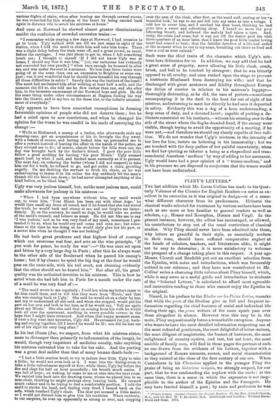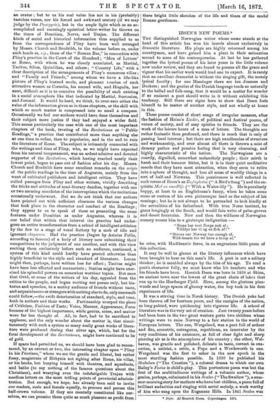PLINY'S LETTERS.*
THE last addition which Mr. Lucas Collins has made to his Quar- terly Volumes of the Classics for English Readers—a series as ex- cellent in its execution as it was original in design—is of a some- what different character from its predecessors. Hitherto the. classical works selected for treatment by various authors have been' such as are more or less familiar to general readers as well as. scholars, e.g., Homer and Xenophon, Horace and Virgil. In the present instance, however, the editor has encouraged, or allowed,, his contributors to step out of the usual curriculum of classical studies. Why Pliny should never have been admitted into these why letters so graceful in their style, so essentially modern, in their tone, should have suffered comparative neglect at. the hands of scholars, teachers, and litteratenrs alike, it might. not be easy to determine ; it is more satisfactory to welcome' the prospect of a change taking place in this respect. A year ago. Messrs. Church and Brodribb put out an excellent selection from the Epistles, with notes and introductions, which was favourably, noticed in our columns ; and they have now contributed to Mr.. Collins' series a charming little volume about Pliny himself, which,. while it may serve as a useful guide and introduction to students.. of the "Selected Letters," is calculated to afford most agreeable-- and instructive reading to those who cannot enjoy the Epistles in, the original.
Nisard, in his preface to the Etudes sur les Poetes Latins, remarks that while the poets of the Decline give us full and frequent in-- formation regarding the chief features of social and individual life- during their age, the prose writers of the same epoch pass over these altogether in silence. However true this may be in the- main, Pliny unquestionably forms a remarkable exception. Anyone- who wants to have the most detailed information respecting one oU the most refined of gentlemen, the most delightful of letter-writers,. the most diligent of magistrates, the busiest of barristers, the most enlightened of country squires, and last, but not least, the most- amiable of family men, will find in these pages the portrait of such. an one drawn from the evidence of his Letters, together with s. background of Roman manners, scenes, and social characteristics, as they existed at the close of the first century of our era. W hem Cassiodorus in his Chronicon applied to the younger Pliny the praise of being an historicus insignis, we strongly suspect, for our part, that he was confounding the nephew with the uncle ; at the= same time, there is a sense in which the expression is not inap- plicable to the author of the Epistles and the Panegyric. He may have fancied himself a poet ; by taste and profession he was► * Pliny's Letters. Ancient Classics for English Renders. By the Rev. Alfred Church,. M.A., and the Rev. W. T. Brodribo, M.A. Edinburgh and London : William Black- wood and eons. 1872. an orator ; but to us his real value lies not in his (probably) tasteless verses, nor his forced and awkward oratory (if we may judge by the Panegyric), but in the ample light which as an ac- complished and amusingly egoistical letter-writer he throws on the times of Domitian, Nerve, and Trajan. The different kinds of social and historical information thus supplied to us from the correspondence of Pliny have been well arranged by Messrs. Church and Brodribb, in the volume before us, under such heads as, e.g., those of the " Roman Bar," in connection with Pliny's practice in the Court of the Hundred ; "Men of Letters" at Rome, with whom he was closely associated, as Martial, Tacitus, Silius, Quintilian, and others; " Country Life," with a clear description of the arrangements of Pliny's numerous villas ; and " Family and Friends," among whom we have a life-like picture of Pliny's learned uncle, and pleasant touches of such attractive women as Cornelia, his second wife, and Hispulla, her aunt, difficult as it is to conceive the possibility of such existing in a social atmosphere like that indicated by Martial, Suetonius, and Juvenal. It would be hard, we think, to over-rate either the value of the information given us in these chapters, or the skill with which so much matter is compressed into so small a compass. Occasionally we feel our authors would have done themselves and their subject more justice if they had enjoyed a wider field. This seems particularly the case with one of the most important chapters of the book, treating of the Recitationes or " Public Readings," a practice that contributed more than anything else at one time to refine, then to popularize, and in the end to ruin the literature of Rome. The subject is intimately connected with the writings and time of Pliny, who, as we might have expected from his natural temperament, was an ardent admirer and devoted supporter of the Recitations, which having reached nearly their lowest point, began to pass out of fashion after his day. Messrs. Church and Brodribb have some excellent remarks on the origin of the public readings in the time of Augustus, mainly from the want of cultivated publishers and intelligent critics. They have culled passages from Pliny and other writers, vividly describing the tricks and attitudes of semi-literary dandies, together with one or two amusing anecdotes of the interruptions which the recitations occasionally underwent. But we do not think that our authors have pointed out with sufficient clearness the various changes that took place in the character and conduct of the Readings ; they appear to us to speak of these as presenting the same features under Domitian as under Augustus, whereas it is our belief that within that interval the practice had under- gone an entire transformation from a school of intelligent criticism by the few to a stage of venal flattery by a mob of idle and ignorant claqueurs. Had the practice (begun by Asinius Pollio, according to Seneca) of a body of literary men submitting their compositions to the judgment of one another, and with this view reciting them exclusively before such an audience, continued, a system of this kind could hardly have proved otherwise than highly beneficial to the style and standard of literature. Lucan might then, perhaps, have written less for effect ; Tacitus might have been less affected and manneristic ; Statius might have exer- cised his splendid powers on somewhat worthier topics. But once that Ovid, or some of the writers of his day, appealed from the critics to the people, and began reciting not poems only, but his- tories and speeches, to a motley audience of friends without taste, and acquaintances or strangers with nothing elseto do, only one result could follow,—the swift deterioration of standard, style, and tone, both in authors and their works. Partizanship usurped the place of Criticism, Fashion of Taste; Voice, Manner, Appearance, Form became of the highest importance, while genius, sense, and matter were far less thought of. All, in fact, had to be sacrificed to
applause, and the only wonder about the matter is, that simul- taneously with such a system so many really great works of litera-
ture were produced during that silver age, which, but for the fatal development of the Recitationes, might have continued to be of gold.
If space had permitted us, we should have been glad to recom- mend, by an extract or two, the interesting chapter upon " Pliny in his Province," where we see the gentle and liberal, but rather fussy, magistrate of Bithynia not sighing after Rome, his villas, or his books, but busying himself with theatres, and aqueducts, and baths (to say nothing of the famous questions about the Christians), and wearying even the indefatigable Trajan with needless letters on the most trifling points of provincial adminis- tration. But enough, we hope, has already been said to invite our readers, male and female equally, to procure and peruse this half-crown volume. If they are mentally constituted like our- selves, we can promise them quite as much pleasure as profit from these bright little sketches of the life and times of the model Roman gentleman.



































 Previous page
Previous page